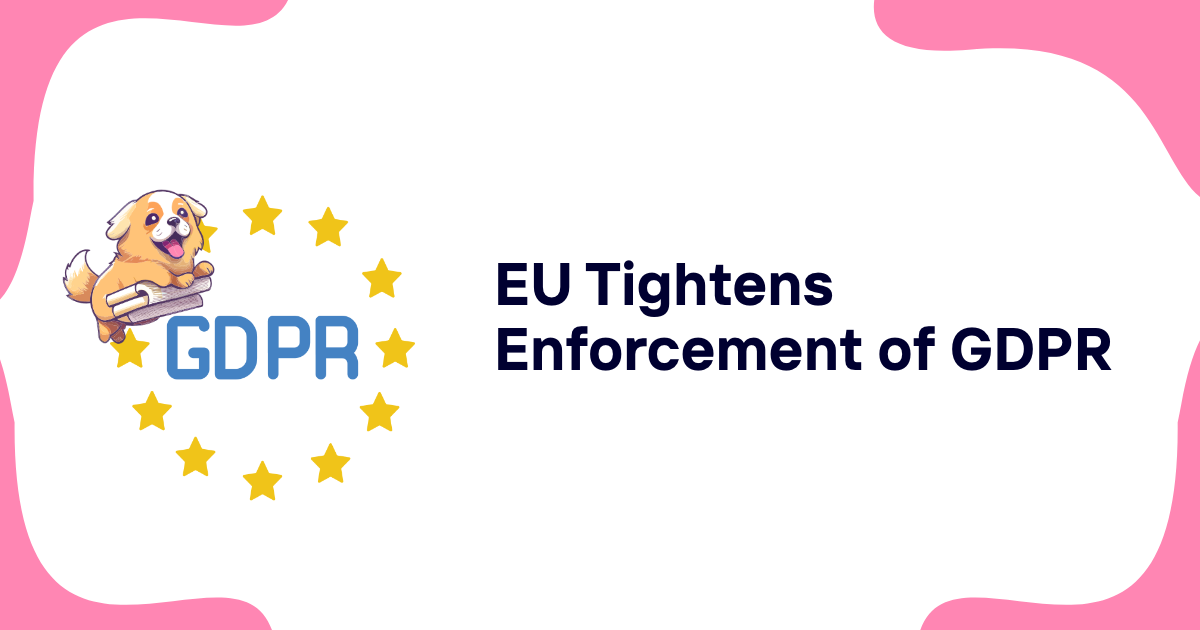Failure to comply with the General Data Protection Regulation (GDPR) can lead to severe consequences for B2B SaaS companies, including hefty fines, legal action, reputational damage, and loss of business opportunities. Here are some of the major risks of non-compliance:
Substantial Financial Penalties
Under GDPR, organizations can face administrative fines of up to €20 million or 4% of their global annual turnover from the previous financial year, whichever is higher. These penalties apply to infringements of key principles like failing to obtain proper user consent or violating data subjects' rights.
For example:
- Meta Platforms Ireland Limited was fined EUR 1.2 billion on May 12, 2023, for insufficient legal basis for data processing.
- Amazon Europe Core S.à.r.l. received a fine of EUR 746 million on July 16, 2021, for non-compliance with general data processing principles.
- TikTok Limited was fined EUR 345 million on September 1, 2023, for similar violations.
For B2B SaaS companies, these massive fines can be financially devastating and potentially crippling, especially when combined with legal fees, damage to brand reputation, loss of customer trust, and other far-reaching consequences of non-compliance.
Disciplinary Actions and Audits
Beyond fines, GDPR violations can trigger disciplinary measures from data protection authorities. This includes official warnings, reprimands, temporary bans on data processing activities, and mandatory periodic audits to assess compliance.
Individuals also have the right to file complaints with supervisory bodies if they suspect their personal data was mishandled. This can prompt investigations and enforcement actions against the company.
For example, if a GDPR violation is reported and upheld, the supervisory authority could impose a ban prohibiting your company from processing the personal data involved in the infringement. This could mean losing access to crucial customer and lead databases if the violation related to unlawful data collection or consent practices. Such a ban would be devastating for a B2B SaaS business that relies on customer data for operations.
It's also important to note that GDPR violations can have ripple effects leading to non-compliance with other laws like consumer protection and competition regulations. This could result in additional fines and penalties from national authorities on top of GDPR enforcement actions.
Liability for Damages and Legal Action
Under GDPR, individuals have the right to claim compensation from companies for material or non-material damages suffered due to violations of their data rights. This could include loss of control over personal data, identity theft, reputational harm, or emotional distress.
Civil law also generally holds companies liable for any unjust harm caused by violating regulations like GDPR or other consumer protection laws. This opens the door for affected individuals or consumer groups to pursue legal action and lawsuits against non-compliant companies.
Liability exposure extends beyond just customer relationships. Business partners, vendors, and third-party platforms you work with may also pursue compensation claims or legal action if your non-compliance violates contractual agreements or causes them damages. For example, a SaaS marketplace could take action against a vendor selling non-compliant software on their platform that violates GDPR and exposes the marketplace to risk.
Loss of Services, Partnerships, and Business Opportunities
Many third-party services like cloud providers, SaaS marketplaces, and app stores require GDPR compliance as part of their terms of service. Violations can lead to severe consequences like account termination, service bans, and even contractual penalties.
Beyond that, GDPR non-compliance can cause you to lose out on lucrative business opportunities and partnerships. Many enterprises and public sector organizations will simply refuse to work with vendors that don't meet data protection standards.
For example, the Amazon Web Services Partner Network’s Terms and Conditions state:
For any Third-Party Data you provide to AWS, you represent and warrant that you have received all necessary consents for (a) you to share the Third Party Data with AWS and its Affiliates, and (b) AWS and its Affiliates to use the Third-Party Data to contact its subject(s) to market our goods and services and the Program.
This quote from the AWS Partner Network terms illustrates how cloud providers can ban non-compliant companies from their ecosystem for GDPR violations around data sharing and consent. Losing access to critical cloud infrastructure would be highly disruptive for a SaaS business.
Criminal Prosecution and Imprisonment
In the most egregious cases of GDPR violations, company executives and employees could face criminal prosecution and potential imprisonment under national laws. This may apply if there is evidence of intentionally breaching data protection rules for financial gain, such as illegally obtaining or selling personal data without consent.
Clearly, the consequences of GDPR non-compliance for B2B SaaS companies are severe and far-reaching, with the potential to cripple a business through massive fines, legal actions, loss of customer trust, and being barred from partnerships and growth opportunities. By thoroughly understanding GDPR requirements and implementing robust data protection practices, companies can mitigate these risks and maintain compliance.
Streamline Compliance with ComplyDog's Automated Solution
Achieving and maintaining GDPR compliance in-house can be an immense challenge for B2B SaaS companies, requiring significant time, resources, and expertise. This is where ComplyDog's automated compliance solution can provide tremendous value.
ComplyDog's software streamlines the entire compliance lifecycle, from data mapping and consent management to security monitoring and breach reporting. Its intelligent workflows and built-in templates help you implement industry best practices while minimizing manual effort.
With ComplyDog, you can focus on scaling your core business with confidence, knowing your data protection responsibilities are fully covered. Visit ComplyDog.com to learn more about our comprehensive compliance platform and get started today.
















